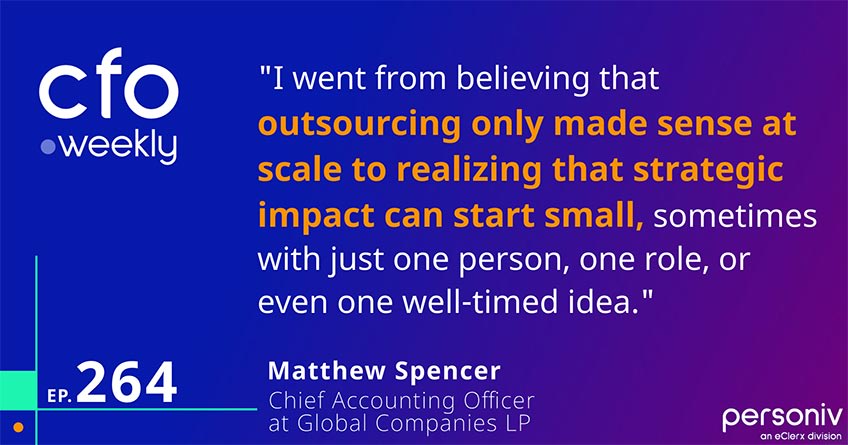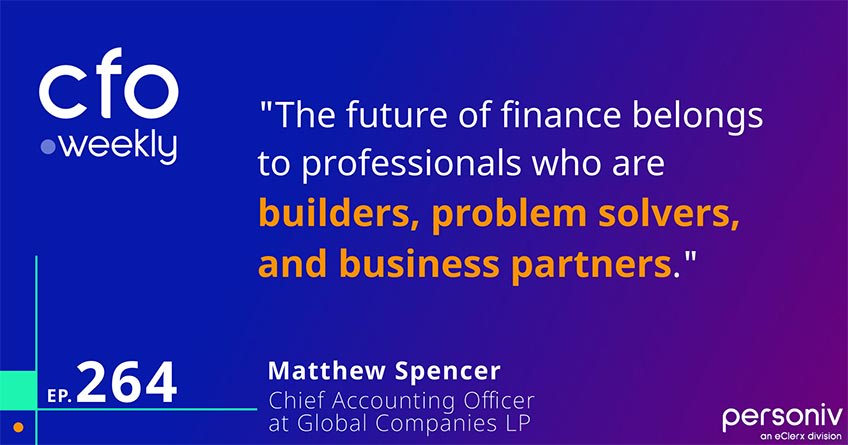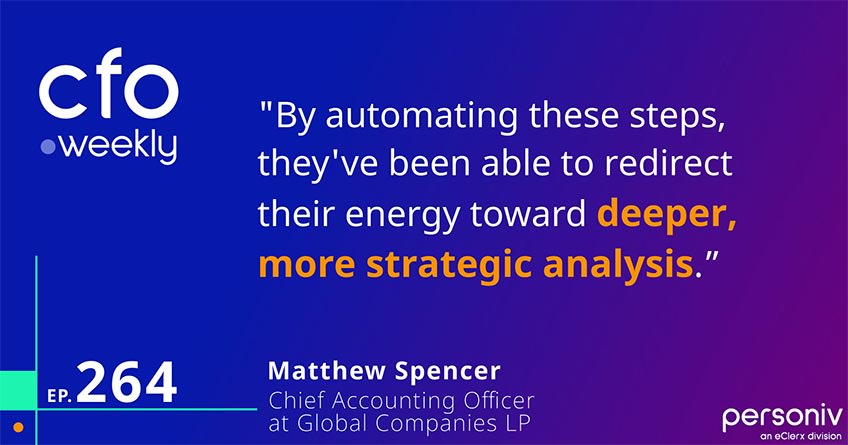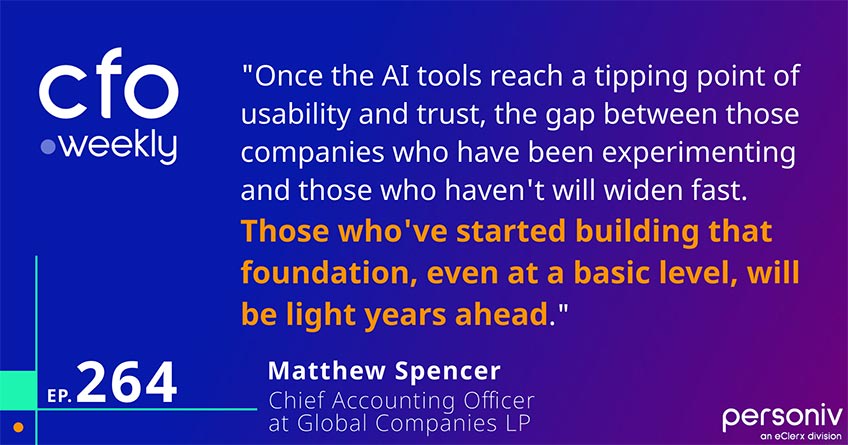
In this episode of CFO Weekly, Matthew Spencer, Chief Accounting Officer at Global Partners, joins Megan Weis to explore how experimentation drives finance innovation and how modern CFOs are building agile, tech-enabled teams through curiosity and strategic use of offshore talent. Matthew brings over 20 years of experience, starting his career at Ernst & Young, where he spent a decade advancing to senior manager before serving as assistant controller at SharkNinja Operating LLC.
With his extensive background in financial reporting, accounting operations, and systems implementation, Matthew shares how finance teams can leverage automation to free up capacity for strategic work, build distributed workforces effectively, and create cultures where innovation thrives through curiosity and ownership. Currently serving as Chief Accounting Officer at Global Partners since 2018, Matthew oversees financial reporting, tax compliance, and internal controls, and has successfully integrated offshore resources that now comprise 15% of the company's finance team.
Show/Hide Transcript
Megan - 0:50: Today, my guest is Matthew Spencer. Matt is the Chief Accounting Officer at Global Partners, a position he has held since 2018. In this role, he oversees financial reporting, accounting functions, tax compliance, internal controls, and plays a key role in the management of the company's financial operations.
Matthew's career in accounting began at Ernst & Young, where he worked for a decade and advanced to the role of senior manager. Following his tenure there, Matthew served as Assistant Controller at SharkNinja Operating LLC. He was instrumental in redesigning the company's accounting processes to enhance management insights and streamline financial reporting. Prior to his current role, Matthew was a Controller at Global from 2012 to 2017. During this period, he played a key role in the implementation of new trade capture and transaction processing systems used within Global's wholesale and commercial segments. The new systems automated certain manual processes and standardized business reporting.
Matthew holds a degree in accounting and information systems from Boston College and is a licensed CPA in Massachusetts. Residing in the Boston area with his wife and two daughters, he is actively involved in his community and is a member of the Northborough-Southborough Regional School Committee. Matt, thank you very much for joining me on this episode of CFO Weekly. It's a pleasure to have you here.
Matthew - 2:18: Yeah, and thank you for having me on. I am excited to be here. This is my first ever podcast appearance, and let's be honest, there's a decent possibility it's also going to be my last. I'm grateful for the opportunity, and I'll try to make it count. I'm also especially grateful for the timing, as we are nearing the holiday season. This gives me a great update for the family newsletter. I can possibly say something to the effect of appearing on a podcast available on Spotify, which sounds far more impressive than it probably is. So for that, I thank you.
Megan - 2:47: Well, that's awesome, and I'm glad we can help you out there.
So, over the course of your career, you've seen firsthand how the finance function has evolved from a focus on numbers, reporting, and compliance to becoming a true driver of strategy, innovation, and enterprise value. Today's finance leaders are being asked to do far more than just close the books. They're expected to build agile, tech-enabled teams that can interpret data, anticipate change, and shape business decisions.
To start, I'd love to hear about your own journey in that evolution. How did your perspective shift over time from viewing finance primarily as a technical or reporting discipline to recognizing it as a strategic capability built on people, process, and technology?
Matthew - 3:33: I wish I could say it was some light-bulb moment where I suddenly saw finance as this driver of innovation. I'm not sure this is going to directly answer your question, but when it comes to building and managing a team, the one story that always seems to come to mind for me is it was about fifteen years ago when I was looking to make the transition out of public accounting. I can remember this HR rep from SharkNinja asking me during my interview, "What experience did I have managing people?"
It's funny to me now, thinking about the answer I provided. I think I went on and on extensively about how I had managed teams at E&Y—of course, I was a senior manager at the time—how I had worked with peers, how I had supported partners or other engagement executives, and even how I had managed client expectations.
But sometime later, the truth hit me the moment I had just one individual reporting to me. Wow, I really had never actually managed anyone before. At E&Y, if someone wasn't performing, you just didn't schedule them on one of your jobs again, and there you go. Problem solved.
But in a leadership role, it's completely different. You are responsible for someone's growth. That means understanding their skills, aligning them with the outcomes that you need, and—I think this is where it ties in—giving them the tools to succeed. As technology continues to change how finance worked, or works, I've learned you need to evolve the team, not just the tools around them. So I would say it's been my growth in leadership roles that has changed my perspective.
Megan - 5:06: And as you mentioned, you began your career at E&Y, which gave you exposure to a wide range of organizations and operating models. So how did those early experiences shape your perspective on how finance teams should be structured and the potential of offshore or outsourced talent?
Matthew - 5:25: During my time at E&Y, I was fortunate to have the opportunity to work with large multinational clients like Staples, Textron, and WABCO. These were organizations with complex finance operations and global footprints, often supported by shared service centers in lower-cost regions such as India or even Eastern Europe.
At that stage of my career, the exposure was both eye-opening and informative. It provided a real-world complement to what I had just learned in college about organizational design, cost optimization, and strategic resource allocation. What stood out was how deeply embedded offshoring and outsourcing were in the operating models of these companies. It wasn't just a tactical decision to save money; it was a strategic lever to drive scalability, standardization, and efficiency across the finance function.
This experience left a lasting impression and perhaps unconsciously shaped my early assumptions about the applicability of these models. Specifically, I came away with the belief—and I think perhaps a bias—that outsourcing was primarily viable for large-scale enterprises. I thought it required a certain level of operational complexity, maybe even geographic dispersion, and certainly process maturity to make the economics and the logistics work.
That assumption stayed with me for quite a while until later in my career when I was directly involved in building and optimizing finance teams for smaller organizations. That's when I realized I had it wrong. Not only can outsourcing work with smaller companies, in many cases, it can be transformative. With the right partners, technology, and process discipline, even lean organizations can access high-quality offshore talent, reduce costs, and enhance their agility.
Megan - 7:10: And as your career progressed, was there a particular moment or project when you realized that even a small finance team or a single outsourced resource could have a truly strategic impact, especially at a growing company like Global Partners?
Matthew - 7:25: Honestly, it didn't begin with some carefully orchestrated transformation. The turning point came from simply being open to a team member's suggestion and being willing to test a new idea at a time when everything around us was already changing.
And although I imagine you might prefer not to, I would ask you to allow your mind to think back to those early days of returning to the office after the COVID-19 pandemic. Like so many organizations, we were forced to rapidly adapt to remote work. And to their credit, my team rose to the occasion with resilience and flexibility.
But as the business continued to grow and we experienced natural turnover, backfilling open roles became more and more difficult. We were stretched thin, and the traditional recruiting process just wasn't keeping up with the pace of our needs. And that's when one of my team members brought up Personiv, a firm, as you well know, that offers outsourced finance professionals on a smaller, more flexible scale.
Up until that point, I still believed that outsourcing was really only viable for large-scale global organizations. But we were feeling the pressure, and the opportunity to try something different aligned with the broader shift towards remote work and distributed workforces. So we decided to pilot a few roles.
And to our surprise, it didn't just work. It worked really well. One outsourced role quickly turned into four, four turned into ten, and before long, we had built out a robust, high-performing offshore capability. And today, Personiv resources make up nearly 15% of our finance team.
That experience fundamentally reshaped my thinking. I went from believing that outsourcing only made sense at scale to realizing that strategic impact can start small, sometimes with just one person, one role, or even one well-timed idea. It also reinforced the importance of being open and willing to experiment, especially in times of uncertainty. More than anything, it taught me that scale isn't just about size, it's about mindset.
Megan - 9:29: I think a lot of companies out there think you have to have a hundred positions to be able to outsource something. And with accounting talent being so hard to find, it just seems like a logical lever.
Matthew - 9:42: I think that's right. The challenge is—and I go back to my early days of some of those embedded assumptions about what is needed and necessary to make something work at scale—a big part of it is really understanding what the need is within the business and what you're solving for. And as long as you can put definitions around that, it's identifying from there who are the right partners that can help you in moving things forward in a practical and expeditious way.
Megan - 10:11: And shifting gears a bit to technology, technology has been a huge part of the evolution lately within finance and accounting. So with AI and automation advancing so quickly, how has that shifted the core skill sets that you're now looking for when you're building or upskilling your team?
Matthew - 10:32: This is an area where, candidly, we at Global are still evolving, and I know we're not the only ones. I would say, actually, just recently, I participated in a roundtable discussion with other chief accounting officers in the Boston area organized by CrossCountry Consulting on this very topic. And the consensus from the group is that there are some patterns that are starting to emerge.
While each experience is different, we're finding that individuals who truly stand out aren't just technically strong. They're intellectually curious and self-driven. They take initiative, explore new tools, and proactively integrate them into their workflows, and not necessarily because they've been asked to, but because they see an opportunity to make something better. Often, it's someone experimenting, identifying inefficiencies, and building small, impactful solutions that improve how we operate.
As a result, I'm rethinking what finance talent looks like. It's no longer enough to have strong accounting fundamentals, although that is probably still table stakes. The future of finance belongs to professionals who are builders, problem solvers, and business partners. I, myself, am looking for people who can connect the dots between systems, data, and business outcomes. People who not only understand the numbers, but also the story behind them, and who are willing to challenge the status quo in pursuit of better, faster, smarter ways of working.
It's less about whether someone knows a specific automation platform or AI tool today; those will certainly change. As AI and automation continue to reshape finance, the skill sets that I now prioritize are adaptability, business acumen, systems thinking, and a genuine curiosity of how things work and how they can work better.
Megan - 12:14: So can you share a tangible example where automation or technology directly freed your team to focus on higher-value strategic work, something that really changed the way finance delivered impact?
Matthew - 12:27: Absolutely. And while we're not quite enjoying the lifestyle depicted on The Jetsons—so no flying, accounting robots navigating our hallways—we have made meaningful progress in integrating automation into our workflows.
Much of the automation we've adopted to date is focused on enabling us to scale efficiently without increasing headcount, and that alone has had a significant impact. But beyond operational efficiency, what's been most exciting is seeing how automation has started to shift how our team spends their time.
In a few standout instances, team members have taken the initiative to automate manual repetitive tasks like data extraction, cleansing, and formatting. That kind of work, although necessary, can be incredibly time-consuming and mentally draining. By automating these steps, they've been able to redirect their energy toward deeper, more strategic analysis.
And the impact has been noticeable. When people are not bogged down by repetitive production work, their capacity for insight expands. We've seen stronger analytical thinking, more proactive contributions to cross-functional initiatives, and just a general higher degree of interest across their daily activities.
What excites me most is that we're really just scratching the surface here. As we continue to build automation into more areas of our operations, I expect the strategic value that our team delivers will increase exponentially. It's not just about doing the same work faster. It's about creating space for better ways of thinking, better decisions, and ultimately, better business outcomes.
Megan - 13:54: Yeah. We're not quite The Jetsons yet, but I am looking forward to seeing where we'll be in three to five years. I think it's an exciting time.
Of course, building the right team is also about finding the right balance. So how do you decide what to keep in house versus what to outsource and ensure that you're not losing institutional knowledge or operational control along the way?
Matthew - 14:14: If I'm being honest, I don't think I've fully cracked the code on balancing in-house expertise with outsourced resources, especially without losing that institutional knowledge. It's a real challenge and one I think a lot of teams are still struggling with in the post-COVID world.
I think what the pandemic taught us is that remote work, and maybe for a lack of a better way of saying it, certainly can work. But in hindsight, I think a big reason it worked was because most people at the time already had that deep institutional knowledge. They knew the business. They understood those unwritten rules, had already built relationships, and could operate with a shared context. So when everything shifted to Zoom or any other virtual platform, those foundations were already in place, which made it easier to stay productive.
Fast forward a few years with natural turnover, new hires, or a more hybrid or distributed model, we're starting to feel some of the friction that comes from not having those shared experiences or context. That's made me think more critically about how do we preserve institutional knowledge and build team spirit when people aren't physically together on a regular basis.
Now, I'm not necessarily advocating for a return to five days a week in the office. So for anyone listening, don't worry quite yet. But I am leaning into the idea that in-person connection, especially for onboarding, complex collaboration, or just business continuity, plays a key role in transferring knowledge, building trust, and reinforcing culture.
And I might say also, on a personal note, I've also had to reflect on my own leadership style. I'm starting to realize that I might simply be a more effective manager when I have more frequent in-person interaction with my team. It's not about control, it's about connection. When I can read the room, check in informally—which is my style, and my team does often joke with me about how I do my daily rounds—this allows me to potentially pick up on the smaller unsaid signals, which I believe better equips me to support people and also guide the work.
So in terms of balancing in-house and outsourced resources, I think what I've learned is that clarity of roles, good documentation, and strong onboarding are critical, but so is maintaining some of that human connection, because I think we can all appreciate that that's where culture and continuity live. And it's what ultimately allows us to scale responsibly without losing what makes our team effective in the first place.
Megan - 16:39: And with so much ambiguity in the world and market shifts constantly present, what strategies do you use to ensure that your finance team continues to innovate and move forward rather than freeze in fear of the unknown?
Matthew - 16:52: One of the most important things I try to do is create an environment where experimentation is safe and I would say encouraged. And to me, what that means is giving people the space to take initiative, try something new, and maybe even fail, as long as they own the outcome. If someone sees an opportunity to automate a report or rethink a process, and if it doesn't work out the first time, that's okay. I will support them 100% of the time. Because what matters isn't perfection, it's momentum, learning, and I guess I can't emphasize this enough, it's ownership.
Innovation doesn't usually show up with a big splash. Often, it starts with someone raising their hand and asking, "What if we did this differently?" So I focus on reinforcing the behaviors that lead to innovation. And I think those are curiosity, accountability—which again ties into that degree of ownership—and collaboration. I also try to be intentional about recognizing and rewarding initiative, even when it doesn't lead to immediate results. The message I want the team to hear is we move forward by trying.
Megan - 17:55: And looking back to those early days at E&Y and comparing them to your work at Global Partners now, how has your view of offshore labor evolved, and what do you think most companies still get wrong or underestimate when it comes to leveraging global talent effectively?
Matthew - 18:12: Well, as I said earlier, for some time, offshore labor felt like something only massive global companies could leverage. But over time, and especially through our experience with Personiv, my perspective has shifted significantly. I think what I've come to realize is that when it's done thoughtfully, offshore support isn't just about cost efficiency. It's about capability and flexibility.
And I think the key is balance. I don't think it's a binary choice between offshore and onshore. It's about finding that right mix. The offshore teams handle the repeatable, scalable work, and our onshore teams stay close to the business, helping drive the strategy and building culture. That hybrid model lets us stay lean without sacrificing quality or control.
And I think what's made it work for us to date is the emphasis on communication, documentation, and building relationships with our offshore partners. When they feel integrated—and I can't speak highly enough on this—when they feel valued, not separate, you don't just get labor support. You gain real extensions of your team.
Megan - 19:18: That's a great answer, by the way. But if we look ahead, which emerging technologies or tools are you most excited about? The ones that you believe could truly reshape the finance function over the next five years.
Matthew - 19:31: It might be obvious, but the answer has to be AI. If AI were a stand-alone stock—and trust me, I recognize there are plenty of opportunities to invest in companies tangential to AI—I'd say buy and hold long-term potential, but slightly terrifying short-term volatility.
That said, I do genuinely believe artificial intelligence has the potential to reshape nearly every aspect of the finance function, from routine processes like closing the books and reconciling data to higher-value activities like forecasting, scenario planning, and strategic decision making.
While there's a lot of hype around AI, the most transformative impact may not be the flashy, headline-grabbing use cases. It might be the quieter, systemic shifts in how we work. We're still in the early innings, and I think we're at least a few years away from truly unlocking AI's full value in finance, especially when it comes to trustworthy, explainable models that finance teams can confidently use.
But that doesn't mean we should sit back and wait. Quite the opposite. I imagine that the smartest organizations are already investing in learning, piloting tools, upskilling their teams, building internal champions, and rethinking workflows with automation and AI in mind. It's about building that muscle memory and getting familiar with the capabilities now. So when the technology does mature, you're not scrambling to catch up.
Because here's the reality: Once the AI tools reach a tipping point of usability and trust, the gap between those companies who have been experimenting and those who haven't will widen fast. And those who've started building that foundation, even at a basic level, will be light years ahead in terms of speed, insight, and adaptability. So, yes, I am very excited about AI, not just as a tool, but as a catalyst for rethinking the role of finance entirely.
Megan - 21:21: And finally, for finance leaders who want to future-proof their teams, what advice would you give about building a culture of continuous learning and openness to new ways of working?
Matthew - 21:33: My advice would be simple, but I hope important. Stay open and make space for your team to do the same. As I've said already, most of the meaningful innovations I've seen didn't come out of formal transformation projects. They came from someone on the team who spotted a friction point and decided to fix it, in many cases, simply by asking, "Why are we doing it this way?"
As finance leaders, we need to actively encourage that mindset. That means creating a culture where curiosity is welcomed, where it's okay to ask questions, test new tools, and occasionally get it wrong, as long as the team is learning and moving forward. We should also support self-development, whether it's providing time for upskilling or sponsoring certifications.
And most importantly, when someone brings you a new idea, listen, and I mean really listen. Even if it's not the right solution, you are reinforcing the behavior that leads to long-term growth. And I think that's how you prepare a team for the future, by showing them they actually have a hand in shaping it.
Megan - 22:34: Matt, it's been a real pleasure having you on CFO Weekly.
Matthew - 22:37: Thank you for the time today. It's been enjoyable. I hope to have another opportunity at some point in the future.
Megan - 22:43: Your perspective on how finance leaders can embrace change while staying grounded in purpose and people is both inspiring and practical, and thank you for sharing your journey with us today.
What You'll Learn:
-
Why curiosity and ownership are the foundational behaviors that drive finance innovation
-
How automation enables teams to shift from repetitive work to strategic analysis
-
Strategies for balancing in-house expertise with offshore resources without losing institutional knowledge
-
The critical role of experimentation and safe failure in building adaptive finance teams
-
How offshore talent can transform operations for companies of any size, not just global enterprises
-
The future of AI in reshaping finance functions and how early experimentation drives innovation
Key Takeaways:
How Strategic Experimentation in Finance Drives Innovation
Strategic transformation often begins by being open to team suggestions and willing to test new ideas during times of change. What starts as a single outsourced role can evolve into a robust offshore capability when leaders maintain an experimental mindset rather than rigid assumptions about scale requirements.

"I went from believing that outsourcing only made sense at scale to realizing that strategic impact can start small, sometimes with just one person, one role, or even one well-timed idea." Spencer pointed out. - 00:07:10 - 00:09:29
Future-Ready Skill Sets
The finance professionals who stand out today aren't just technically strong—they're intellectually curious, self-driven individuals who proactively explore new tools and integrate them into workflows. Future finance talent must be builders and problem solvers who connect systems, data, and business outcomes while challenging the status quo.

"The future of finance belongs to professionals who are builders, problem solvers, and business partners." Spencer revealed. - 00:10:32 - 00:12:14
Automation Enabling Strategic Work
Automation's greatest value lies in freeing team members from repetitive manual tasks like data extraction and formatting, allowing them to redirect energy toward deeper strategic analysis. When people aren't bogged down by production work, their capacity for insight, proactive contributions, and analytical thinking expands significantly.

As Spencer put it, "By automating these steps, they've been able to redirect their energy toward deeper, more strategic analysis.” - 00:12:27 - 00:13:54
AI Experimentation: The Key to Finance Innovation
AI has potential to reshape every aspect of finance from routine closing processes to strategic forecasting and decision making. While full maturity is years away, organizations must invest now in experimentation, piloting tools, and upskilling teams to build capabilities before the technology reaches its tipping point.

"Once the AI tools reach a tipping point of usability and trust, the gap between those companies who have been experimenting and those who haven't will widen fast. Those who've started building that foundation, even at a basic level, will be light years ahead." Spencer highlighted. - 00:19:31 - 00:21:21
For more interviews from the CFO Weekly podcast, check us out on Apple Podcasts, Spotify, and our RSS or your favorite podcast player!
Instructions on how to follow, rate, and review CFO-Weekly are here.
Ready to build a more adaptive finance team? We deliver premier financial and accounting solutions tailored to help businesses drive strategic growth and operational excellence. Drop us a line today to learn more.





















